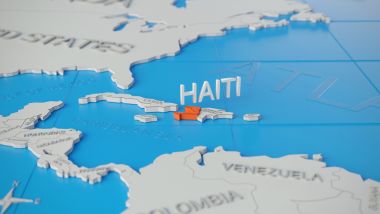Medical missionary who once criticized the UN's work in Haiti wants them back after government collapse

(CP) As gangs overrun Haiti to the point where it is now dangerous for even American missionaries to be there, Dr. David Vanderpool, a trauma surgeon who co-founded the medical ministry LiveBeyond, which does significant work in the Caribbean nation, says he believes the United Nations needs to return to help stabilize the country despite its checkered history there.
"I think the government collapse was really the thing that precipitated this widespread gang violence. We've always had gang violence, but not nearly as widespread," Vanderpool, a Christian surgeon from Dallas, Texas, who has served globally in medical missions, told The Christian Post in a recent interview.
For years, Vanderpool says he was a fierce critic of the U.N. and its work in Haiti due to significant mismanagement of abuses committed by peacekeepers. These abuses include a Cholera outbreak beginning in 2010 that killed more than 10,000 Haitians and infected over 820,000 others. It was caused by Nepalese peacekeepers dumping waste next to a major river supplying water to several villages. The U.N. peacekeepers were still discharging their waste into public canals as late as 2014. There were also significant reports of sexual abuse and exploitation of women and children, as well as human rights abuses committed by U.N. peacekeepers.
In graduate research for Boston University titled, Peacekeeping in Haiti: Successes and Failures, Mariana Cabrera Figueroa concluded that even though the U.N. achieved some success in infrastructure building and democracy during its time in Haiti, it failed in its humanitarian mission, which caused a significant divide among the Haitian people about the value of its work there.
"The U.N., as we know, is an international organization dedicated to peace, communication, and humanitarianism. It succeeded, eventually, in helping Haiti rebuild its infrastructure and democracy in a more peaceful environment. It failed, however, on the humanitarian aspect of its own mission," wrote Figueroa.
"By allowing U.N. peacekeepers to act in ways that abused and exploited the Haitian people, the U.N. allowed the mission to continue its unintended effects on civilians. Had the United Nations intervened in the toxic peacekeeping culture shown in Haiti, it might have saved many Haitians from sexual and physical abuse, or from death by cholera," she added.
In October 2017, the U.N. closed down the United Nations Stabilization Mission in Haiti, popularly known by its acronym MINUSTAH after it was established by Security Council resolution 1542 on June 1, 2004. The mission replaced a multinational interim security force that had been in place since February of that year when Jean-Bertrand Aristide, the nation's first democratically elected president, and former priest, was ousted from power in a coup.
In July 2021, nearly four years after MINUSTAH pulled out of Haiti, the country's then-President Jovenel Moïse was assassinated, leaving the country to become overrun by gang rule.
Vanderpool believes the departure of MINUSTAH opened a door for the gangs which he hadn't seen coming.
"They were providing security for Haiti. [The] United Nations had many problems. I was one who criticized them. When they leave, and everything goes down, you realize that they were actually doing a good job, so I had to repent for that," he told CP.
"When they [U.N.] left, there was really no security force that could counter the gangs at their level. The gangs are exceptionally well-armed. They used to just have rusted revolvers. Now, we've actually seen medium Russian-made machine guns in their hands, which is very disconcerting," Vanderpool said. "I think those two factors — the collapse of the government and the departure of the United Nations Security Force — were the two big impacts [that] opened the door for the gangs to expand rapidly."
Vanderpool's call for the U.N.'s return to Haiti comes as the U.N. Security Council, with strong support from the U.S., is considering a proposal to allow Kenya to lead a 1,000-member multinational contingent of police officers that would help train and assist Haitian police in restoring order to the country.
"I've been calling for this (international security support) since 2019. I think the U.N. has got to come back. You know, they left in 2017 [when] their mission was complete. And then of course, immediately after that the country devolved into violence. And in the United Nations Charter, it's in their charter that this is what they do — provide security in low-income countries like this. And so, it's incumbent upon them, absolutely incumbent upon them, to come in now," Vanderpool insisted. "It's been four very long years of violence for the Haitian people."
The Texas surgeon also believes that security support from the international community needs to be military grade.
"I don't know that a police force is going to be sufficient. These gangs have armored vehicles, and they have medium machine guns, which are very ferocious. I think the police are going to be way out-armed and outmanned. It needs to be a military force, in my opinion. However, anything that we can get done there will be a help," he said.











